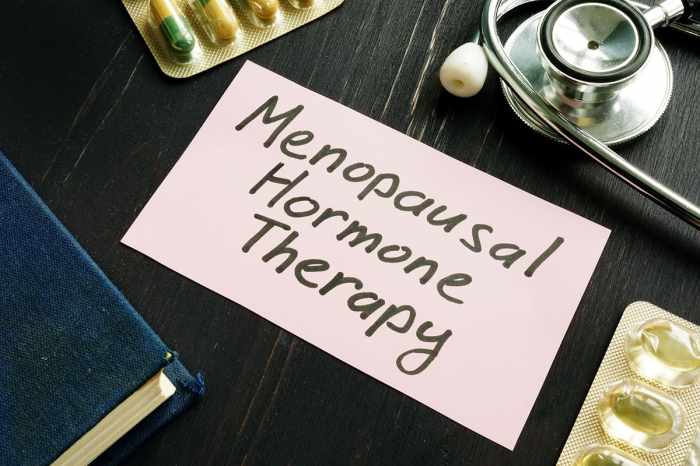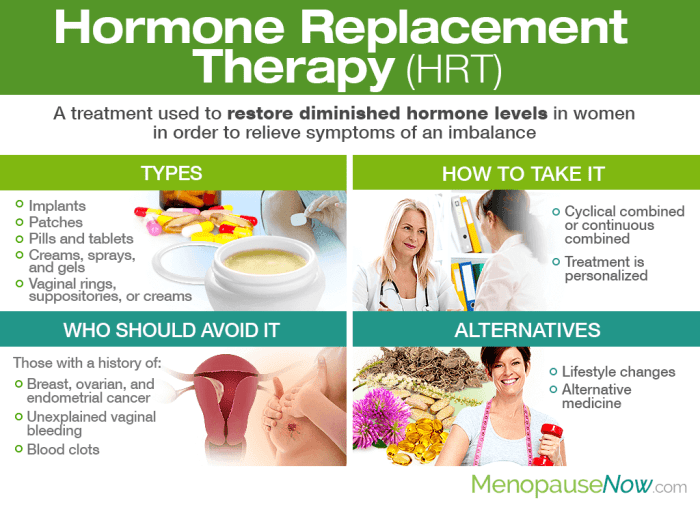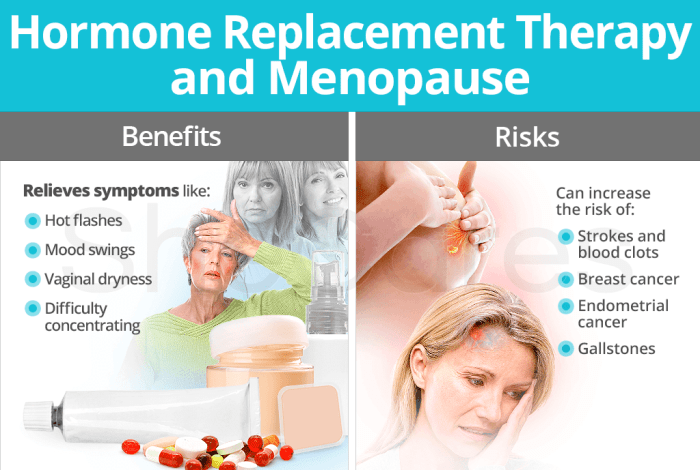Menopausal hormone therapy (MHT) is a treatment option for women experiencing the symptoms of menopause, such as hot flashes, night sweats, and vaginal dryness. MHT involves taking hormones that replace the ones that the body stops producing during menopause. There are different types of MHT, including hormone replacement therapy (HRT) and selective estrogen receptor modulators (SERMs).
Each type has its own benefits and risks, and the best option for a particular woman will depend on her individual needs and health history.
Menopausal Hormone Therapy (MHT)

Menopausal hormone therapy (MHT) is a treatment option for women experiencing symptoms of menopause, such as hot flashes, night sweats, vaginal dryness, and mood swings. MHT involves taking hormones that replace the ones that the body stops producing during menopause.MHT can be used to relieve symptoms of menopause and improve quality of life.
It can also help to prevent osteoporosis and reduce the risk of heart disease and stroke. However, MHT is not right for everyone, and there are some risks associated with it, such as an increased risk of blood clots, stroke, and breast cancer.
Types of MHT
There are two main types of MHT: hormone replacement therapy (HRT) and selective estrogen receptor modulators (SERMs).* HRTreplaces the estrogen and progesterone that the body stops producing during menopause. HRT can be taken in a variety of forms, including pills, patches, and injections.
SERMsare a type of medication that binds to estrogen receptors in the body. SERMs can be used to relieve symptoms of menopause, such as hot flashes and night sweats, but they do not replace estrogen. SERMs are also used to prevent osteoporosis.The following table summarizes the different types of MHT, their benefits, and potential risks:| Type of MHT | Benefits | Potential Risks ||—|—|—|| HRT | Relieves symptoms of menopause, prevents osteoporosis, reduces the risk of heart disease and stroke | Increased risk of blood clots, stroke, and breast cancer || SERMs | Relieves symptoms of menopause, prevents osteoporosis | Increased risk of blood clots, stroke, and breast cancer |
Risks and Side Effects of MHT

Menopausal hormone therapy (MHT) is generally safe and well-tolerated, but like any medication, it can have potential risks and side effects.
Blood Clots
MHT can increase the risk of blood clots, especially in women who are over 60 years old, have a history of blood clots, or are taking certain medications that increase the risk of blood clots.
Stroke
MHT can slightly increase the risk of stroke, especially in women who are over 65 years old, have high blood pressure, or have other risk factors for stroke.
Breast Cancer
Long-term use of combined MHT (estrogen and progestin) has been linked to an increased risk of breast cancer. The risk is small, but it is important to be aware of it before starting MHT.
Other Side Effects, Menopausal hormone therapy
Other potential side effects of MHT include:
- Nausea
- Vomiting
- Abdominal pain
- Headache
- Mood changes
- Vaginal bleeding
Factors That Increase the Risk of Side Effects from MHT
The risk of side effects from MHT is increased by the following factors:
- Age
- Health history
- Type of MHT
- Dosage of MHT
- Length of time taking MHT
Table Comparing the Risks and Benefits of MHT for Different Age Groups and Health Conditions
The risks and benefits of MHT vary depending on the woman’s age and health condition. The following table provides a general overview of the risks and benefits of MHT for different age groups and health conditions:
| Age Group | Health Condition | Risks | Benefits |
|---|---|---|---|
| Women under 60 | Healthy | Low risk of side effects | Effective for relieving menopausal symptoms |
| Women over 60 | Healthy | Increased risk of side effects | May not be as effective for relieving menopausal symptoms |
| Women with a history of breast cancer | – | Increased risk of breast cancer recurrence | Not recommended |
| Women with a history of blood clots | – | Increased risk of blood clots | Not recommended |
Who is a Candidate for MHT?
Menopausal hormone therapy (MHT) is a treatment option for women experiencing symptoms of menopause, such as hot flashes, night sweats, and vaginal dryness. However, MHT is not suitable for all women. Certain factors need to be considered when determining who is a good candidate for MHT.
Factors to Consider
The decision of whether or not to start MHT should be made in consultation with a healthcare provider. Factors that should be considered include:
- Age
- Menopausal status
- Medical history
- Personal preferences
- Goals of therapy
Alternatives to MHT: Menopausal Hormone Therapy
Menopausal hormone therapy (MHT) is not the only option for managing menopausal symptoms. Several alternative treatments can provide relief without the potential risks and side effects of MHT.
Alternative treatments can be categorized into three main groups: lifestyle changes, herbal remedies, and acupuncture.
Lifestyle Changes
Making healthy lifestyle changes can significantly improve menopausal symptoms. These changes include:
- Maintaining a healthy weight
- Eating a balanced diet rich in fruits, vegetables, and whole grains
- Getting regular exercise
- Reducing stress
- Getting enough sleep
Herbal Remedies
Certain herbal remedies have been shown to alleviate menopausal symptoms, including:
- Black cohosh
- Red clover
- Evening primrose oil
- Chasteberry
Acupuncture
Acupuncture is a traditional Chinese medicine technique that involves inserting thin needles into specific points on the body. It has been found to be effective in reducing hot flashes and other menopausal symptoms.
Conclusion
Menopausal hormone therapy (MHT) can effectively alleviate menopausal symptoms and reduce the risk of certain chronic conditions. However, it’s crucial to be aware of the potential risks and benefits before starting MHT.
MHT is not suitable for everyone. Women with a history of certain medical conditions, such as breast cancer, should not use MHT. It’s essential to consult with a healthcare professional to determine if MHT is right for you.
Benefits of MHT
- Reduces hot flashes and night sweats
- Improves sleep quality
- Prevents bone loss
- Reduces the risk of heart disease and stroke
Risks of MHT
- Increased risk of breast cancer
- Increased risk of blood clots
- Increased risk of stroke
The risks and benefits of MHT vary depending on the type of hormone therapy used, the dosage, and the duration of treatment. It’s essential to discuss these factors with your healthcare professional to make an informed decision about whether MHT is right for you.
Concluding Remarks

MHT can be an effective treatment for the symptoms of menopause, but it is important to weigh the benefits and risks before starting treatment. Women who are considering MHT should talk to their doctor about the risks and benefits and decide if it is the right option for them.
Popular Questions
What are the benefits of MHT?
MHT can help to relieve hot flashes, night sweats, and vaginal dryness. It can also help to improve bone density, reduce the risk of heart disease, and improve cognitive function.
What are the risks of MHT?
MHT can increase the risk of blood clots, stroke, and breast cancer. The risk of these side effects is higher in women who are over 60 years old, who have a history of blood clots or stroke, or who have a family history of breast cancer.
Who is a good candidate for MHT?
MHT is a good option for women who are experiencing bothersome symptoms of menopause and who are not at high risk for the side effects of MHT.